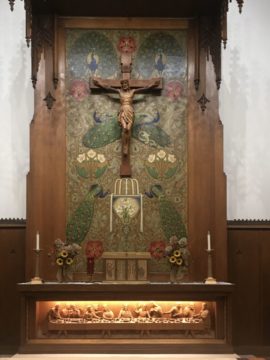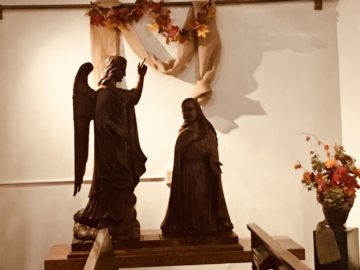As we continue to focus on the Gospel of Luke for our Sunday Scriptures, we offer a Franciscan Gospel reflection and questions written by Fr. Paul Gallagher, OFM for your prayer. They are edited by Franciscan Sister of Christian Charity Sister Anne Marie Lom and Joe Thiel. The excerpts from the Sunday readings are prepared by Joe Thiel. To read or download the complete pdf with excerpts for your prayer, please click here: Franciscan Gospel Reflection November 17 2019. Excerpts are from the Lectionary for Mass for Use in the Dioceses of the United States of America, second typical edition © 2001, 1998, 1997, 1986, 1970 Confraternity of Christian Doctrine, Inc., Washington, DC. Used with permission. All rights reserved. No portion of this text may be reproduced by any means without permission in writing from the copyright owner. Photos: Annunciation Church, Green Bay, Wisconsin
Luke 21:5-19
While some people were speaking about how the temple was adorned with costly stones and votive offerings, he [Jesus] said, “All that you see here–the days will come when there will not be left a stone upon another stone that will not be thrown down.”
Then they asked him, “Teacher, when will this happen? And what sign will there be when all these things are about to happen?” He answered, “See that you not be deceived, for many will come in my name, saying, ‘I am he,’ and ‘The time has come.’ Do not follow them! When you hear of wars and insurrections, do not be terrified; for such things must happen first, but it will not immediately be the end.” Then he said to them, “Nation will rise against nation, and kingdom against kingdom. There will be powerful earthquakes, famines, and plagues from place to place; and awesome sights and mighty signs will come from the sky.
“Before all this happens, however, they will seize and persecute you, they will hand you over to the synagogues and to prisons, and they will have you led before kings and governors because of my name. It will lead to your giving testimony. Remember, you are not to prepare your defense beforehand, for I myself shall give you wisdom in speaking that all your adversaries will be powerless to resist or refute. You will even be handed over by parents, brothers, relatives, and friends and they will put some of you to death. You will be hated by all because of my name, but not a hair on your head will be destroyed. By your perseverance, you will secure your lives.
Background:
Luke is the author of both the Gospel of Luke and the Acts of the Apostles. Luke’s community would be familiar with both. Many of the things Jesus taught in the Gospel came to be fulfilled in the life of the Christian community and are described in Acts, which was written about the year 80-85 AD.
The people for whom Luke is writing had a much different sense of time than most Americans. They lived in the present and did not worry about preparing for the future (Give us this day our daily bread). The present had enough challenges to overcome without adding those of the future. Past events quickly faded in importance. It was up to God to hold the past and be attentive to the approaching future.
The prophets of the day were gifted with a glimpse into the mind and time of God. There were also prophets who believed God had given them some insight, but their insights turned out to be false. It was difficult to know which were the false and which were the true prophets until the unfolding of the foretold events actually did or did not come to pass. This reality influences how Luke presents Jesus to his readers. Luke portrays Jesus as a prophet whose words do come true. His followers should be reassured that their faith in Jesus is true and they have not been led astray by some false prophet.
The first verses of the text speak of the splendor of the temple. This temple was rebuilt when the Jews returned from being enslaved in Babylonia, and it was renovated under King Herod. After the renovations, the temple surpassed the splendor of the original built by Solomon, and it became a source of great pride among the Jews. In the second verse of today’s Gospel (Luke 21:6), Jesus predicts the destruction of the temple. It came to pass when Rome invaded Jerusalem in 70AD, and it had already taken place when Luke was writing this gospel.
Most of the text is not about the fall of Jerusalem or the destruction of the Temple, rather, the signs that will lead up to these things. They are “signs” because they are not about the events themselves, but about some deeper hidden reality. Because they are signs, people will need someone to interpret their meaning. In verse 8, Jesus says that some will come and say, “I am the one who can interpret these events for you,” yet they will be mistaken. Jesus does not want the people to be misled. The signs themselves include the political and the natural world. The disturbances in these arenas will lead to personal turmoil. Jesus’ followers will endure suffering at the hands of the government, their neighbors, and even family. All will suffer during this period; they will suffer because they are Jesus’ followers. Jesus urges them to persevere.
Reflection Questions:
1. Have there been events in your personal history that have affected your ability to live with a sense of hope and trust in the goodness of God? Have there been events in your personal history that have been sources of great hope? Is there any relationship between the two sets of events?
2. Jesus exhorts us in the Gospel not to be terrified. Are there people, news sources, or websites that seem to fuel your fears about the church, the world, and the future? Who are the people, and what are the news sources and the things that fuel your trust and hope in the God who cares for every person and every bird of the air? Which do you give more of your time to in your daily life?
3. Can you think of a time in human history when there has not been war, persecution, hardship, and a reason to have fear? Can you think of a time when there have not been people who proclaimed scenarios of disaster?
4. Was God not present in those times? Who were the people who could see the hand of God in those times? What do you need to learn from those people?
5. Jesus gives two exhortations in today’s text: Do not be deceived! Do not be terrified! Do either of these speak to you and your life situation today? How would you like to respond to God’s exhortation to you?
6. Why do you think that the church gives us readings with an apocalyptic flavor yearly during this time of the church year? What is it they want us to reflect on? Why?




